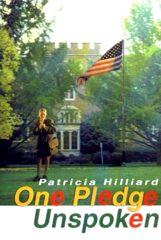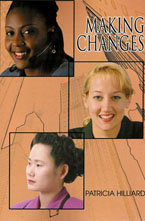Books by Patricia Hilliard:
The students of the 1960's challenged patriotism because they were being sent to a war in Vietnam that benefited no one.
"The people in Vietnam had not threatened us. Our own govern-ment was threatening us," said author, Patricia Hilliard, who wrote the novel based on her own anti-war activism.
One Pledge Unspoken is about Elizabeth Ellen Anderson, a high school student who protests war during the 1960's. Growing up in a pro-union working class family, she struggles to understand the contradictions in society on such issues as war, racism and sexism while she attempts to exercise her democratic right to free speech.
Reviews of
One Pledge Unspoken:
Writer's Digest 11th Annual International Self-Published Book Awards: "I was very captivated by the writing style and the sophisticated tone of the book. I think setting the story in the 60's is also such an interesting twist for a YA novel. ...the correlations of this time period are again upon us. ...This type of book carries the reader through similar situations and aids in the understanding of such modern concerns...the author has done a superb job creating her characters, most especially Bet while giving life and substance to the ancillary characters as well. ...Wonderful job on a very well-written and intense YA novel. This would make a strong candidate on any YA list."
MyShelf.com
"The reader will rejoice in the victories of these students, and feel their pain and their anxiety as they deal with the expectations of their parents, the pressures of school, and sexual relationships before abortion was legal, and birth control was not even discussed. In an era when politics belonged to men who were expected to go to war willingly as a sacrifice for government policies, and then to be the sole support for their families, and women were expected to work in the factory or get married, their destinies seemed to be sealed: change was difficult." --Beverly Row
Midwest Book Review
"One Pledge Unspoken is a powerful story, relevant for our troubled times and straight from her heart." --Whelan's Bookshelf
B-Independent.com
"One Pledge Unspoken" has to be one of the most interesting young adult novels I read since Robert Cormier. It is readable, entertaining, a little antagonizing, and in your face. Try it out." --Mike Purfield
One Pledge Unspoken
What drove students in the 1960s to challenge patriotism?
Making
Changes
Can workers win better pay and benefits?
Bored with their jobs and tired of being underpaid, the women workers of the American Empire Insurance Company decided to try something different. They decide to organize their fellow workers into a union.
The women face the built in conflicts of cultural and economic differences to stand shoulder to shoulder as the company challenges them for control of their lives at work.
The main characters represent the diversity of the American workforce: Ellen Anderson comes from a predominantly white, rural Ohio small town where she has helped her uncle organize factory workers, Karen Davis is a college educated African-American working mother. Pia Li, a student, is from the garment district of New York's Chinatown. While these women office workers fight for their rights on the job, Jane Rutledge, the legal secretary, is privy to the schemes of management. Caught between the workers and management, she tries to decide whose side she is on.
This is a historical novel that takes place in the 1980's during the election of Ronald Reagan and the attack on the air traffic controllers union. When the AFL-CIO calls for a big dem-onstration to defend workers' rights, the women of the American Empire Insurance Company join the demonstration and begin to dream of a different world, a world where workers win.
This book is a good discussion tool for organizers and activists in the labor movement.
About the Author:
Patricia Hilliard has been a writer and activist for 30 years. This book is based on her experience as an "in-shop" union organizer. She is a member of the National Writers Union.
Book Review of Making Changes:
Women workers on a risky journey
By Rosemary Neidenberg
Patricia Hilliard’s first book, “One Pledge Unspoken,” transported the reader to the 1960s and a reliving of the struggle of small-town Midwest high school students against the Vietnam War. (Does anyone remember running leaflets on a mimeograph machine?)
“Making Changes” takes us to a large Cleveland insurance company office in the 1980s. The women workers, the supervisors, the bosses—they’re all here, so authentic in every detail. The personal lives of the workers, their problems, interests, life-plans, the way they think and dress and talk are real and recognizable.
Particularly familiar and poignant is the woman who collects figurines. She buys one every week. Do you know her? I do.
The mix of heritages found in every big-city workplace is there—newly arrived, as well as third-generation descendants—from Europe, Asia, the Caribbean, and women many generations out of Africa. Each cog in the American Empire Insurance Co. is a beautifully etched dimensional portrait.
The drudgery of the data-entry work, the drabness of the fluorescent-lit rows of computer-adorned desks—one shudders to envision it. But brightening the picture are the lunchtime, break-time, stealthy stolen moments from work-time, camaraderie of the workers, the confidences about personal problems, the kidding around, the mosaic of personalities to deal with and gossip about (particularly the bosses and supervisors). And there is the occasional delicious event when the workers get over on management.
Ellen Anderson, leader and instigator, is happy to get the data-entry job. She will be able to pay her rent and buy film for her camera. Spiritual kin to the high-school anti-war organizer in the 1960s, she rejoices in an exciting prospect. She is determined to organize a union.
Hilliard provides a step-by-step, nitty-gritty, hold-your-breath account of how the disparate, generous, flawed, gutsy, disregarded, underpaid women office workers embark on their risky journey.
Anyone who has been involved in union organizing will recognize and relive the moments of desperation, the moments of triumph, the strategy meetings to counter each move of the bosses, the feelings of deep disappointment when it looks like the workers will lose, the exhilaration when victory is in sight.
Do the workers win? Well, it cannot be imagined that Hilliard would write a book where the workers lose.
________________________________________
Articles copyright 1995-2012 Workers World. Verbatim copying and distribution of this entire article is permitted in any medium without royalty provided this notice is preserved. Workers World, 55 W. 17 St., NY, NY 10011 http://www.workers.org/2005/us/hilliard-0630/index.html
Published Jun 23, 2005

